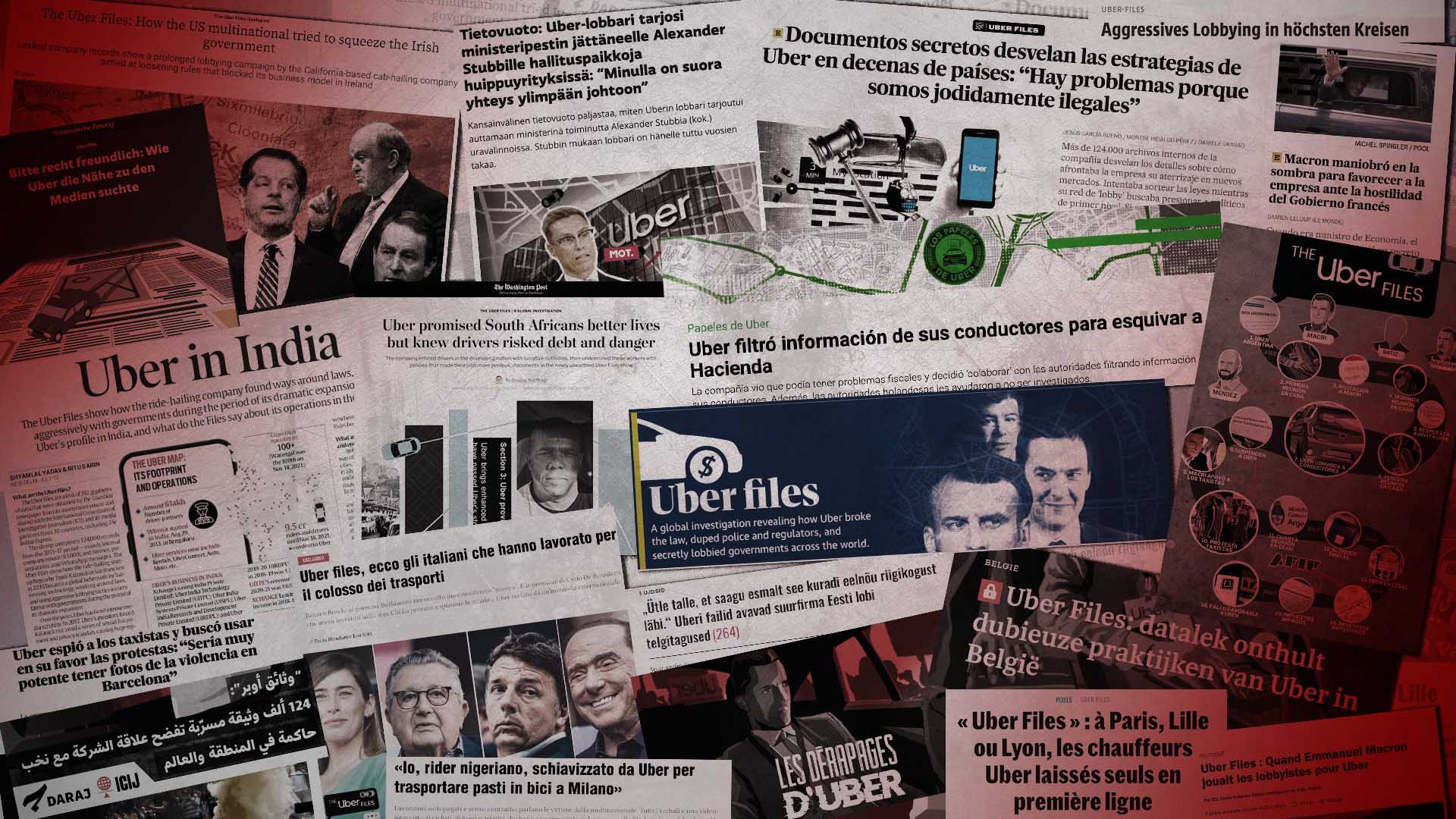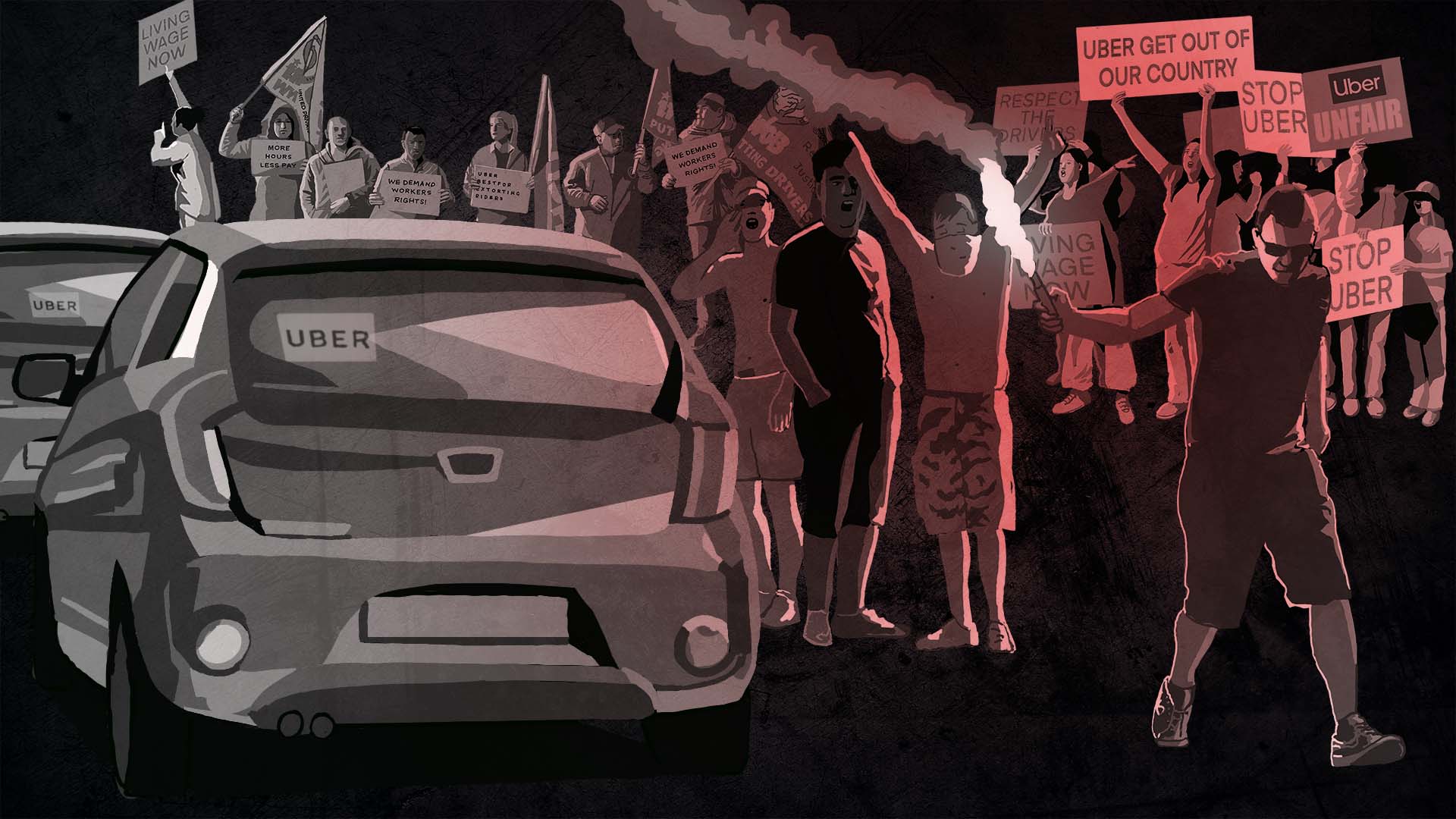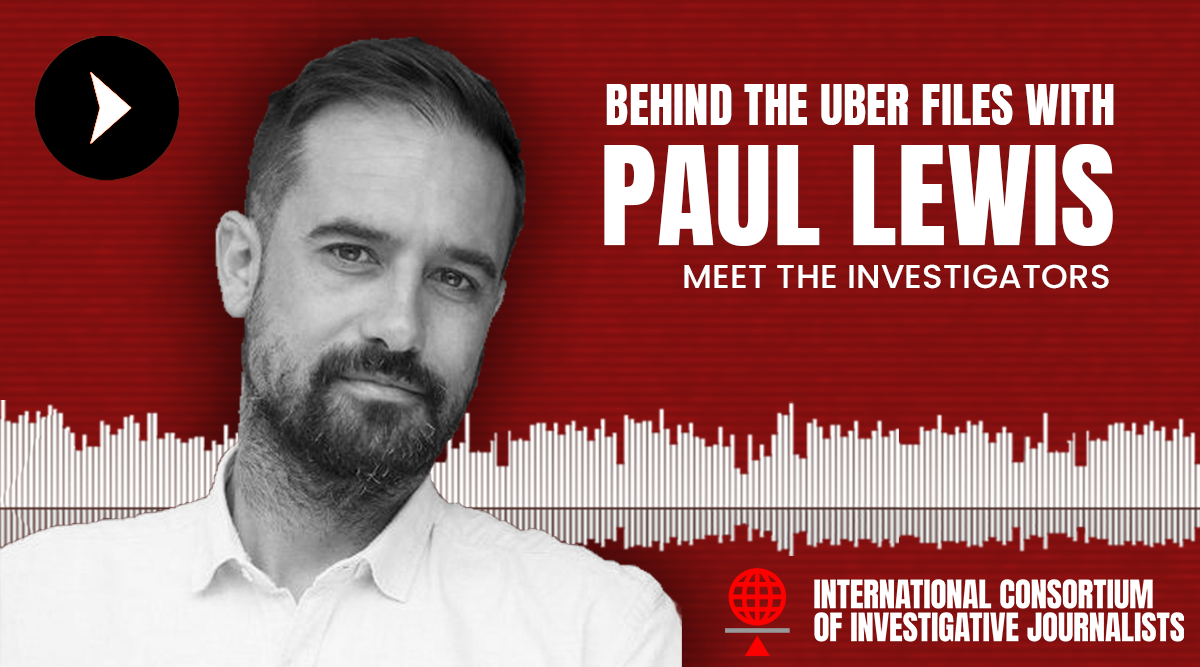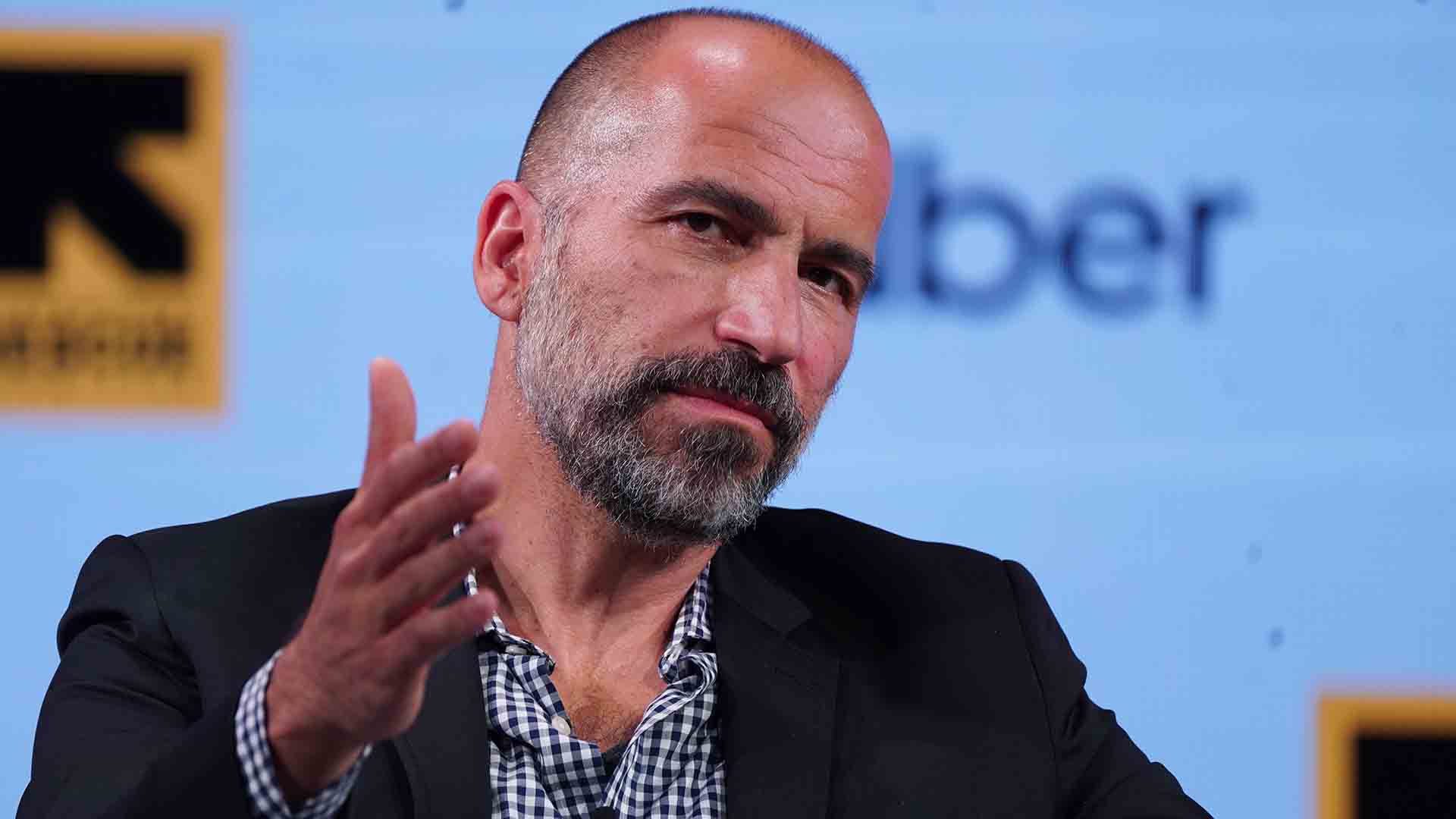Driver exploitation, research-for-pay, spying and dodging law enforcement were some of the bombshells uncovered by journalists working on the Uber Files, a journalistic collaboration that involved reporters in 29 countries.
The investigation, based on a leak of thousands of internal documents and communications exchanged by top Uber executives, government officials and world leaders, was spearheaded by the International Consortium of Investigative Journalists and British news outlet The Guardian. The files expose how the ride-hailing giant Uber stormed into markets around the world by deploying an army of lobbyists to influence politicians and legislation, used technology to thwart regulators and law enforcement, and spun violence against its drivers in the company’s favor.
Here are some highlights from reporting by ICIJ’s partners around the world.
Uber’s lobbying machine courts world leaders
The Uber Files revealed the global lobbying operation the company deployed to establish itself in different continents.
In Israel, then-Prime Minister Benjamin Netanyahu and his colleagues forged a friendly relationship with Uber executives, ICIJ partner Shomrim reported. After meeting with the company, Netanyahu voiced support for Uber during a public clash with his transportation minister, who was opposed to Uber. The company also leveraged U.S. officials and their counterparts, including then-Israeli Ambassador to the U.S. Ron Dermer and then-U.S. Ambassador to Israel Dan Shapiro, to halt a criminal investigation into the company’s permitless operations, according to Haaretz.
The Uber Files also reveal Uber’s ties with Ireland’s then-prime minister Enda Kenny. Leaked documents show Uber claimed to have written part of a manifesto Kenny published supporting Uber’s sharing economy model. The Irish Times reported that the company made inroads with Kenny thanks to lobbyist John Moran, Ireland’s former Department of Finance secretary general.
France’s Le Monde reported on Uber’s extensive relationship with then-Finance Minister Emmanuel Macron, who had a direct line to the company’s chief executive Travis Kalanick. Media partners exposed how prominent former Obama administration aides hired by Uber, including campaign veterans David Plouffe and Jim Messina, worked to secure access to top officials in countries around the world, meeting with then-Prime Minister Mariano Rajoy in Spain, then-Prime Minister Matteo Renzi in Italy and attempting to forge relationships with Dubai ruler Sheikh Mohammed Rashid Al Maktoum and officials in the the United Kingdom using Tory connections. ICIJ partners in the Netherlands also investigated how Dutch politician and former European Commission vice president Neelie Kroes became an informal adviser for Uber, and assisted the company during her mandated cooling-off period.
ICIJ partners also detailed influence campaigns in Estonia, where former MP Kalle Palling was involved in conflicts of interest, and Finland, where one company executive offered former Prime Minister Alexander Stubb informal job consulting.
In 2015, the company tried to gain the support of Argentinian President Mauricio Macri and professional footballer Lionel Messi, reported ICIJ partners Infobae, La Nación and elDiarioAr. Uber wasn’t successful — Macri didn’t accept an invitation to meet with Uber executives and sided with cabbies during clashes, and Messi’s team said they never met with Uber representatives. Still, the company fared well in the South American country: Today Uber operates in 16 Argentinian cities and in 2019 it received tax breaks despite its questionable regulatory standing, according to Infobae. Uber declined to answer specific questions from ICIJ partners in Argentina. It said in a statement that it has led the expansion of the ride-sharing industry in the country.
The documents show that after facing regulatory obstacles in Saudi Arabia, Uber switched strategies by approaching the royal family and its close associates, ICIJ partner Daraj Media reported. Uber approached two government ministers who were identified in internal documents as “close allies” of the company. It also sent David Plouffe, the architect of Barack Obama’s 2008 presidential campaign, to lobby for the company in Saudi Arabia. Uber’s efforts were successful, according to Daraj Media. The company today operates in the kingdom’s major cities. In 2020, Princess Reema bint Bandar joined its advisory board and Prince Mohammed bin Salman invested nearly $3.5 billion in Uber.
In Romania, Uber hired a controversial lobbyist named Peter Imre, a politically connected local consultant, RISE Project reported. The company’s public policy manager for Central and Eastern Europe raised concerns about Imre’s potential influence peddling
Several ICIJ partners reported on how Uber lobbied Russian oligarchs and others in Russian President Vladimir Putin’s inner circle.
Uber’s media and research offensive
The Uber Files showcase the company’s tactics to woo media owners, including strategic investment deals with German publishing company Axel Springer – whose holdings include top German tabloid Bild and now U.S. publications Politico and Insider – and the Times of India group, The Guardian, The Washington Post and Süddeutsche Zeitung reported.
Several ICIJ partners also reported on how the Silicon Valley startup paid experts for reports that would help move its agenda forward in countries where Uber’s expansion faced strong resistance or regulatory pressure.
Uber Files shows that a few months after launching in Germany in 2014, Uber paid renowned economist and political advisor Justus Haucap $44,000 to author a report that ultimately advocated for reform of transportation regulations, ICIJ partner Süddeutsche Zeitung reported. The 2015 study “Opportunities of digitalization in the urban mobility market” appeared in several media outlets and said it was commissioned by Uber. Süddeutsche Zeitung reported that although such studies are common in German academia, they are still problematic because the results could be biased. The publisher of the academic report told Süddeutsche Zeitung they “adhere to all scientific standards in the preparation of the study.”
ICIJ partner Le Monde reported that, in 2014, while Uber faced significant pushback in Europe, the company paid renowned economists Augustin Landier and David Thesmar $100,000 for research that could be used as part of the company’s lobbying campaign. Uber wanted to show it was creating jobs by the thousands while providing structure for the informal economy.
“What we are sorely lacking in France at the moment is precisely scientific or academic evidence supporting our arguments,” an Uber executive wrote in an email. While the consultancy deal was acknowledged in a footnote in the report, details of the fee weren’t. Landier and Thesmar told ICIJ partners their paid consultancy for Uber was declared and transparent and didn’t comment further, The Guardian reported.
Uber drivers said they were deceived, exploited
In September 2014, as Uber was expanding in Finland, it requested a legal opinion about potential enforcement issues. A law firm warned that it was possible both Uber and its drivers could be held criminally liable for operating without a taxi license. ICIJ’s Finnish partner Yle reported that the ride-hailing company launched without advising drivers of the potential legal troubles, even as it trained them before the launch. Uber’s omission had consequences for the drivers: “At least 128 Uber drivers have been subject to criminal investigations related to their work since 2017. Almost 60 drivers were sentenced for operating a taxi illegally,” Yle reported. Drivers who attended the 2014 training told Yle that they left believing that driving for Uber did not require a taxi license and that they weren’t doing anything illegal. They said Uber didn’t assist them with legal aid or subsidies to pay the fines. Joel Järvinen, Uber’s manager in Finland from 2014 to 2022, declined to answer Yle’s questions, saying he no longer works for Uber.
In Italy ICIJ partner L’Espresso told the story of low-income workers who were exploited while delivering food for UberEats, a subsidiary of Uber Italy, in some of the country’s major cities. In 2020, Uber’s Italian branch was placed under judicial supervision after investigators found the company underpaid hundreds of workers to deliver meals by bicycle. The workers, mostly African and Asian immigrants, had no contract, worked up to 12 hours a day for 400 to 500 euros (about $480 to $600) per month. Osaradion Uwnmahongie, a 27-year-old Nigerian immigrant and former UberEats worker told L’Espresso: “There was always an excuse to pay us less. Many customers on the Internet gave us tips, but I never received them.”
Uber used technology to dodge law enforcement investigations
The Uber Files revealed how Uber used stealth technology to thwart government raids in several countries.
On May 13, 2015, as Canadian tax authorities raided two Uber offices in Montreal, investigators noticed that company computers, smartphones and tablets suddenly restarted at the same time. The agents — who were looking into whether Uber was avoiding sales taxes and helping its drivers dodge a mandatory service tax — worried the company data was being manipulated from afar. Unbeknownst to agents and authorities, Uber was activating a so-called “kill switch” to cut access to company servers and prevent authorities from seizing evidence during raids, ICIJ partners CBC and Radio Canada reported. A Canadian judge would later say that Uber’s move “bears all the hallmarks of an attempt to obstruct justice.”
The Uber Files reveal that the kill switch was employed in at least five other countries: France, Netherlands, Hungary, India, and Romania.
The Romanian police spent two hours at the Bucharest office in 2015, after reportedly receiving an anonymous complaint, reported Rise Project, an ICIJ partner. The authorities questioned the company’s general manager but didn’t take any documents or access computers. The Uber Files reveal that the office followed “IT protocol,” blocking access to servers so that investigators couldn’t see internal messages and documents.
How Uber dealt with violence against its drivers and passengers
The Uber Files gave journalists and the public an unprecedented look into how the company dealt with violence faced by its drivers and passengers.
ICIJ partner The Washington Post reported that in South Africa, Uber attracted drivers by offering bonuses and incentives and then cutting them back, knowingly creating working conditions that put drivers at risk. Post reporters drew from the leaked documents and interviews with 20 current and former drivers and four former Uber managers to show that, during its market expansion in Cape Town and Johannesburg, Uber “rewarded workers for undertaking routes and schedules that put them at risk of harm in locations plagued by violence.”
In Spain, El País and La Sexta reported that when Uber launched in Barcelona in 2014 without authorization or proper licenses, the company sought to exploit violent clashes between cabbies and Uber drivers to pressure authorities to approve legislation favorable to the platform. “It would also be very powerful to have photos of violence in Barcelona, from this week and other incidents,” wrote Mark MacGann, Uber’s chief lobbyist in Europe, Africa and the Middle East at the time. (MacGann identified himself as the source behind the leak following the publication of the Uber Files.) In Madrid, Uber hired an investigative firm to spy on taxi unions and identify weaknesses, key organizers and “sources of funding.” A report, issued by the investigative firm in December 2014, suggested Uber should exploit fractures among the different unions, according to La Sexta.
In response to Uber Files findings, a company spokesperson acknowledged past mistakes in Uber’s treatment of drivers but said no one at the company wanted violence against its drivers.
In Decemeber 2014, a woman riding an Uber vehicle was raped by the driver in New Delhi. The incident stirred protests and the platform was banned for months in India’s capital. ICIJ’s partner The Indian Express reported that the company sought to place the blame on India’s government and shift responsibility from its own drivers’ screening system. Following the incident, Uber pledged to install so-called panic buttons on every vehicle, which “should trigger an alert to the police” to make emergency calls even when passengers can’t access their smartphones. However, The Indian Express found, the panic button wasn’t installed or didn’t work in 48 out of 50 recent rides journalists took.







